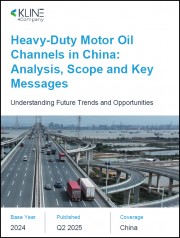
|
시장보고서
상품코드
1792537
승용차용 모터 오일 시장 분석 : 점도 등급별, 유형별, 지역별(2025-2033년)Passenger Car Motor Oil Market Report by Viscosity Grade (Multi Grade, Mono Grade), Type (Full Synthetic, Synthetic Blend, Conventional, High Mileage), and Region 2025-2033 |
||||||
세계의 승용차용 모터 오일 시장 규모는 2024년 208억 달러에 달했습니다. IMARC Group은 향후 시장이 2033년까지 236억 달러에 이르고 2025년부터 2033년까지 1.37%의 성장률(CAGR)을 보일 것으로 예측했습니다.
승용차용 모터 오일(PCMO)은 승용차 엔진 전체의 보호와 기능 향상에 도움이 됩니다. 모터 오일은 내연 기관을 윤활하여 가동부에 발생하는 마찰을 줄입니다. 승용차용 모터 오일은 석유 기반 탄화수소에서 얻은 기본 오일의 조합으로 만들어집니다. 이 오일은 부식과 녹의 발생을 막을뿐만 아니라 엔진 내의 퇴적물의 형성을 억제합니다.
인구 증가, 소득 수준 향상, 도로 인프라 개선 등의 요인으로 인해 승용차 판매는 선진국과 개발도상국 모두에서 증가하고 있습니다. 이는 승용차용 모터 오일 수요에 긍정적인 영향을 미칩니다. 또한 유럽과 북미와 같은 선진국에서는 소비자가 고품질의 모터 오일이 제공하는 이점을 인식하고 있습니다. 예를 들어, 소비자들 사이에서 모노 그레이드에서 멀티 그레이드 오일로의 전환이 진행되고 있으며, 시동 리드 타임을 단축함으로써 저온 시동시의 펌프 능력과 연비, 성능 효율을 향상시키고 있습니다. 또한 승용차용 모터 오일은 마찰과 마모 감소, 장비 보호, 온도 제어, 수명과 효율성 향상, 엔진 부품 신뢰성 향상 등의 이점을 제공합니다.
이 보고서에서 답변을 얻을 수 있는 주요 질문 :
- 세계의 승용차용 모터 오일 시장은 지금까지 어떻게 추이하고 향후 어떻게 추이할 것인가?
- 세계의 승용차용 모터 오일 산업의 주요 지역 시장은?
- 세계의 승용차용 모터 오일 업계에서 COVID-19의 영향은?
- 점도 등급별 시장 구분은?
- 유형별 시장 구분은?
- 세계의 승용차용 모터 오일 산업의 밸류 체인에서 다양한 단계란?
- 세계의 승용차용 모터 오일 산업에서 주요 촉진요인과 과제는?
- 세계의 승용차용 모터 오일 산업의 구조와 주요 기업은?
- 세계의 승용차용 모터 오일 업계에서 경쟁 정도는?
- 세계의 승용차용 모터 오일 업계의 이익률은?
목차
제1장 서문
제2장 분석 범위 및 수법
- 분석 목적
- 이해관계자
- 데이터 소스
- 1차 정보
- 2차 정보
- 시장 추정
- 상향식 접근
- 하향식 접근
- 분석 방법
제3장 주요 요약
제4장 소개
- 개요
- 주요 업계 동향
제5장 세계의 승용차용 모터 오일 시장
- 시장 개요
- 시장 실적
- COVID-19의 영향
- 시장 구분 : 점도 등급별
- 시장 구분 : 유형별
- 시장 구분 : 지역별
- 시장 예측
제6장 시장 구분 : 점도 등급별
- 멀티 그레이드
- 시장 구분 : 유형별
- 25W-50/25W-60
- 15W-40/15W-50
- 20W-40/20W-50
- 10W-30/10W-40
- 시장 구분 : 유형별
- 모노 그레이드
- 시장 구분 : 유형별
- SAE 40
- SAE 30
- SAE 50
- SAE 20
- 시장 구분 : 유형별
제7장 시장 구분 : 유형별
- 완전 합성
- 합성 블렌드
- 기존
- 장거리 주행용
제8장 시장 구분 : 지역별
- 북미
- 아시아태평양
- 유럽
- 중동 및 아프리카
- 라틴아메리카
제9장 SWOT 분석
- 개요
- 강점
- 약점
- 기회
- 위협
제10장 밸류체인 분석
제11장 Porter's Five Forces 분석
- 개요
- 구매자의 협상력
- 공급기업의 협상력
- 경쟁도
- 신규 참가업체의 위협
- 대체품의 위협
제12장 가격 분석
제13장 경쟁 구도
- 시장 구조
- 주요 기업
- 주요 기업 프로파일
The global passenger car motor oil market size reached USD 20.8 Billion in 2024. Looking forward, IMARC Group expects the market to reach USD 23.6 Billion by 2033, exhibiting a growth rate (CAGR) of 1.37% during 2025-2033.
Passenger car motor oil, or PCMO, helps in protecting and improving the overall functioning of engines in passenger cars. The motor oil lubricates the internal combustion engines which reduces the friction created in the moving parts. Passenger car motor oils are made from a combination of base oils that are obtained from petroleum-based hydrocarbons. These oils prevent the occurrence of corrosion and rust as well as obstruct the formation of deposits in the engine.
On account of factors such as increasing population, rising income levels, improving road infrastructure, etc., the sales of passenger cars are rising across both developed and developing regions. This has created a positive impact on the demand of passenger car motor oils. Moreover, across developed regions like Europe and North America, consumers are becoming aware of the benefits offered by high-quality motor oils. For instance, there has been a shift among consumers form mono-grade to multi-grade oils, which offer improved pumpability, mileage and performance efficiency in cold start-up temperatures by reducing the startup lead time. Moreover, passenger car motor oils also provide benefits in terms of reduction of friction and wear, equipment protection, temperature control, increased lifespan and efficiency, and enhance the reliability of engine components.
Key Market Segmentation:
Breakup by Viscosity Grade:
- Multi Grade
- 25W-50/25W-60
- 15W-40/15W-50
- 20W-40/20W-50
- 10W-30/10W-40
- Mono Grade
- SAE 40
- SAE 30
- SAE 50
- SAE 20
Breakup by Type:
- Full Synthetic
- Synthetic Blend
- Conventional
- High Mileage
Breakup by Region:
- North America
- Asia Pacific
- Europe
- Middle East and Africa
- Latin America
Competitive Landscape:
The report has also analysed the competitive landscape of the market along with the profiles of the key players.
Key Questions Answered in This Report:
- How has the global passenger car motor oil market performed so far and how will it perform in the coming years?
- What are the key regional markets in the global passenger car motor oil industry?
- What has been the impact of COVID-19 on the global passenger car motor oil industry?
- What is the breakup of the market based on the viscosity grade?
- What is the breakup of the market based on the type?
- What are the various stages in the value chain of the global passenger car motor oil industry?
- What are the key driving factors and challenges in the global passenger car motor oil industry?
- What is the structure of the global passenger car motor oil industry and who are the key players?
- What is the degree of competition in the global passenger car motor oil industry?
- What are the profit margins in the global passenger car motor oil industry?
Table of Contents
1 Preface
2 Scope and Methodology
- 2.1 Objectives of the Study
- 2.2 Stakeholders
- 2.3 Data Sources
- 2.3.1 Primary Sources
- 2.3.2 Secondary Sources
- 2.4 Market Estimation
- 2.4.1 Bottom-Up Approach
- 2.4.2 Top-Down Approach
- 2.5 Forecasting Methodology
3 Executive Summary
4 Introduction
- 4.1 Overview
- 4.2 Key Industry Trends
5 Global Passenger Car Motor Oil Market
- 5.1 Market Overview
- 5.2 Market Performance
- 5.3 Impact of COVID-19
- 5.4 Market Breakup by Viscosity Grade
- 5.5 Market Breakup by Type
- 5.6 Market Breakup by Region
- 5.7 Market Forecast
6 Market Breakup by Viscosity Grade
- 6.1 Multi Grade
- 6.1.1 Market Trends
- 6.1.2 Market Breakup by Type
- 6.1.2.1 25W-50/25W-60
- 6.1.2.1.1 Market Trends
- 6.1.2.1.2 Market Forecast
- 6.1.2.2 15W-40/15W-50
- 6.1.2.2.1 Market Trends
- 6.1.2.2.2 Market Forecast
- 6.1.2.3 20W-40/20W-50
- 6.1.2.3.1 Market Trends
- 6.1.2.3.2 Market Forecast
- 6.1.2.4 10W-30/10W-40
- 6.1.2.4.1 Market Trends
- 6.1.2.4.2 Market Forecast
- 6.1.2.1 25W-50/25W-60
- 6.1.3 Market Forecast
- 6.2 Mono Grade
- 6.2.1 Market Trends
- 6.2.2 Market Breakup by Type
- 6.2.2.1 SAE 40
- 6.2.2.1.1 Market Trends
- 6.2.2.1.2 Market Forecast
- 6.2.2.2 SAE 30
- 6.2.2.2.1 Market Trends
- 6.2.2.2.2 Market Forecast
- 6.2.2.3 SAE 50
- 6.2.2.3.1 Market Trends
- 6.2.2.3.2 Market Forecast
- 6.2.2.4 SAE 20
- 6.2.2.4.1 Market Trends
- 6.2.2.4.2 Market Forecast
- 6.2.2.1 SAE 40
- 6.2.3 Market Forecast
7 Market Breakup by Type
- 7.1 Full Synthetic
- 7.1.1 Market Trends
- 7.1.2 Market Forecast
- 7.2 Synthetic Blend
- 7.2.1 Market Trends
- 7.2.2 Market Forecast
- 7.3 Conventional
- 7.3.1 Market Trends
- 7.3.2 Market Forecast
- 7.4 High Mileage
- 7.4.1 Market Trends
- 7.4.2 Market Forecast
8 Market Breakup by Region
- 8.1 North America
- 8.1.1 Market Trends
- 8.1.2 Market Forecast
- 8.2 Asia Pacific
- 8.2.1 Market Trends
- 8.2.2 Market Forecast
- 8.3 Europe
- 8.3.1 Market Trends
- 8.3.2 Market Forecast
- 8.4 Middle East and Africa
- 8.4.1 Market Trends
- 8.4.2 Market Forecast
- 8.5 Latin America
- 8.5.1 Market Trends
- 8.5.2 Market Forecast
9 SWOT Analysis
- 9.1 Overview
- 9.2 Strengths
- 9.3 Weaknesses
- 9.4 Opportunities
- 9.5 Threats
10 Value Chain Analysis
11 Porters Five Forces Analysis
- 11.1 Overview
- 11.2 Bargaining Power of Buyers
- 11.3 Bargaining Power of Suppliers
- 11.4 Degree of Competition
- 11.5 Threat of New Entrants
- 11.6 Threat of Substitutes
12 Price Analysis
13 Competitive Landscape
- 13.1 Market Structure
- 13.2 Key Players
- 13.3 Profiles of Key Players












